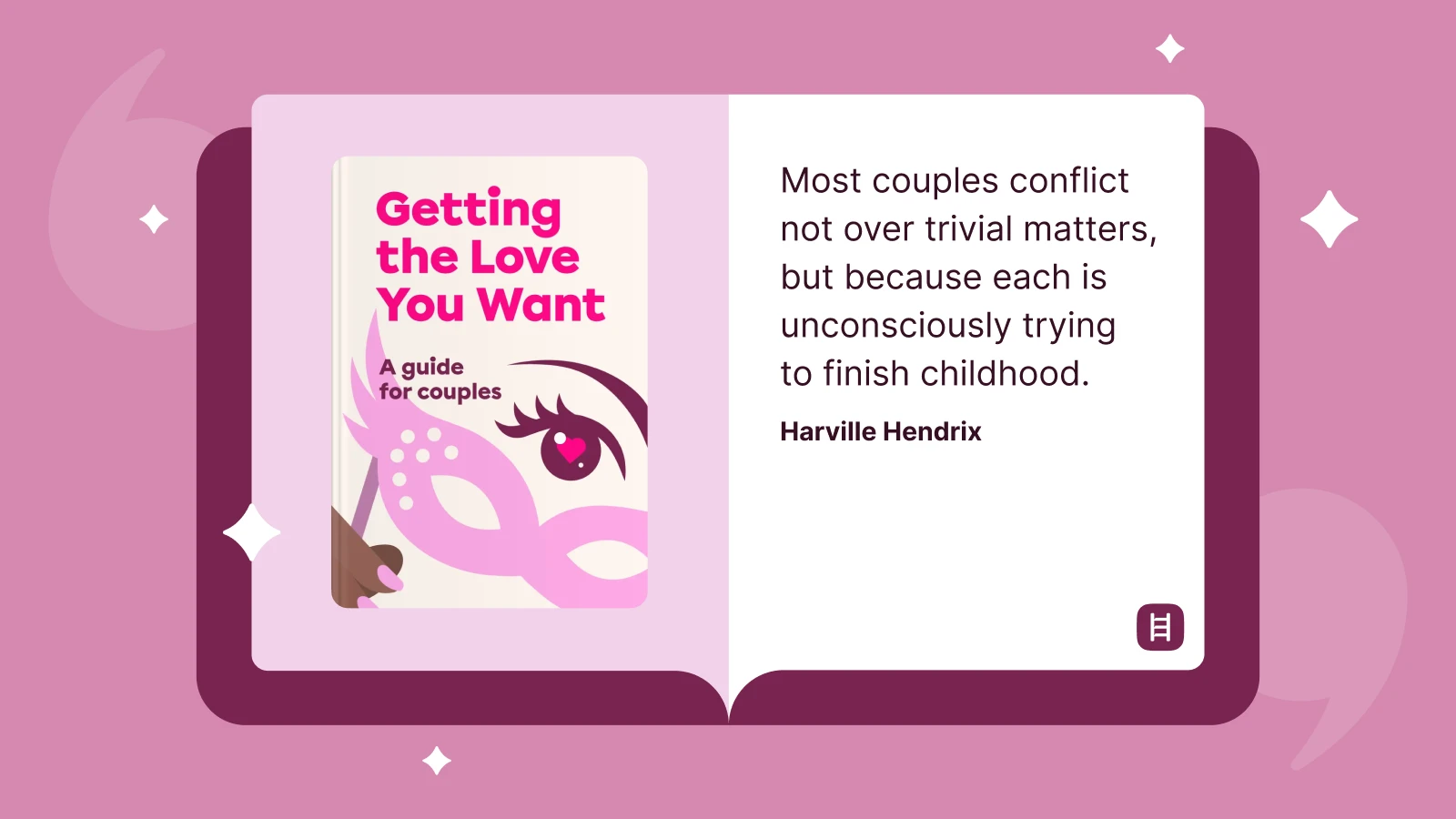Rebuilding trust in a relationship means repairing a breach of trust through honesty, consistent action, open communication, and restoring emotional and physical safety. It's also about creating a sense of safety that supports intimacy and emotional well-being.
As a relationship coach and trauma educator, I've seen how a betrayal of trust can unravel even the most committed partnerships. When trust breaks, partners often cycle between anger, withdrawal, and doubt. It's not just an emotional wound — it's also a shock to the body, affecting your nervous system, stress levels, and overall mental health.
Trust doesn't vanish forever when it's broken — you can rebuild it with the right approach. This guide blends insights from classic relationship books (summarized in the Headwaw app) with trauma-informed somatic practices. Inside, you'll find practical tools from therapy and lived experience to help partners restore safety, honesty, and intimacy.
Here's what you'll find:
The 3 stages of trust recovery: acknowledgement, consistent action, and emotional reconnection
The 7 core steps with book cues and somatic tips
A self-check table to see where you are
An interactive quiz for clarity
Expert insights from therapists and researchers
Rebuilding trust includes three stages: acknowledgement, consistent action, and emotional connection. Each are detailed below in seven essential steps. If you want more tools to practice them in real life, download Headway to get bite-sized book insights that guide you through every stage.
Quick tip: The essential steps to rebuild trust in a relationship
Here are the basics to get you started:
Acknowledge the breach of trust honestly and validate feelings.
Apologize sincerely and take responsibility.
Use open communication and listen with vulnerability.
Show consistent actions and follow through over time.
Reaffirm emotional connection with daily appreciation.
Each of these steps is easier with proven frameworks — explored in relationship classics like 'The Mastery of Love' and 'The 5 Love Languages,' which we've summarized for you in the Headway app. If you're unsure whether the dynamic is worth repairing, review these seven red flags in relationships.
Research echoes this framework: therapists emphasize that rebuilding trust starts with acknowledgement, clear accountability, and repeated action. For example, Couples Learn highlights honesty and transparency as the foundation of repair, while Choosing Therapy stresses consistency and boundaries as the behaviors that sustain it.
The seven steps on how to rebuild trust in a relationship
Follow these tips and learn to trust your partner!
1. Acknowledge the breach of trust
Honesty is the first repair tool. After all, avoiding the truth only delays healing and comes at the cost of trust issues. Facing betrayal means naming it clearly and validating your betrayed partner's feelings.
Book cue: In ‘No More Mr. Nice Guy,' Dr. Robert Glover writes, "Recovery begins with telling the truth — to yourself and to others."
Somatic tip: Ground yourself by placing both feet on the floor. If your partner feels frozen, pause and breathe together.
Thought question: Can you name what happened without minimizing or justifying the experience?
2. Understand the root causes and motivations
Every rupture has deeper issues. Was the reason due to unmet needs, avoidance, or fear? Exploring the "why" allows empathy and reduces blame.
Book cue: In ‘Getting the Love You Want’, Harville Hendrix notes, "Most couples conflict not over trivial matters, but because each is unconsciously trying to finish childhood."
Somatic tip: Notice sensations like heat in your chest when defensive. Pause before responding.
Thought question: What need was ignored or hidden here?
In new relationships, this step helps prevent old cycles and spot patterns like love bombing. If the dynamic feels undefined, you may be in a situation where boundaries and clarity are essential before trust can grow.
3. Apologize and take consistent action
Apologies matter most when paired with follow-through. Consistency in daily actions shows your betrayed partner that the wound is being cared for. Real change is often slow, but attentive hard work makes repair possible.
Experts agree that apologies alone don't work. Verywell Mind notes that couples who rebuild trust after betrayal rely less on grand gestures and more on small, reliable actions that restore safety over time.
Book cue: Don Miguel Ruiz, in ‘The Mastery of Love’, reminds us, "You don't need to justify love, it is there or not there." Repair comes from consistent choice, not one-time words.
Somatic tip: Pair your apology with steady breathing and a relaxed posture. Your body communicates sincerity first.
Thought question: How can you prove your apology through small, steady actions?
4. Communicate openly and listen deeply
Open, vulnerable dialogue is a cornerstone of a healthy relationship. When you listen without defensiveness, you help your partner feel heard and protect your mental health from cycles of avoidance and reactivity.
Book cue: ‘The 5 Love Languages’ shows how attunement helps rebuild trust.
Somatic tip: While listening, feel your sit bones on the chair or your feet on the ground. This anchors you and signals presence.
Thought question: Do you listen to understand, or only to defend?
If communication feels hard, learn from examples in trusted relationship podcasts.
5. Build trust through new rituals and shared experiences
Trust needs new memories. Shared rituals, like weekly check-ins, dinners, or gratitude practices can become anchors of stability.
Book cue: In ‘Somebody to Love’, Sharon Salzberg explains that "true intimacy is built not through grand gestures, but through the small acts of presence and joy."
Somatic tip: Begin rituals with grounding. Hold hands, breathe in sync for three breaths, then speak.
Thought question: What ritual can you create that symbolizes safety?
Shared rituals are a healthy way to reconnect and prevent old wounds from resurfacing. Even small gestures, like publicly acknowledging your partner, can symbolize commitment and a shared sense of safety.
6. Practice patience — trust grows over time
Healing isn't linear. Many couples feel tempted to give up when the pain feels overwhelming. However, trust can be rebuilt when both partners stay committed to growth, often with the help of couples counseling or a licensed LMFT. Therapy guides also warn against rushing.
Choosing Therapy notes that healing can take months or years, and pressure for quick repair often backfires. Practicing patience means learning when to let go of urgency and allowing healing to unfold in its time. Couples counseling also provides a safe space to process pain without falling into blame cycles.
Psych insight: Trust is rebuilt through time, repetition, and reliability.
Somatic tip: When frustration rises, shake your arms and breathe deeply before continuing.
Thought question: Are you allowing the healing process to unfold, or pressuring for instant repair?
7. Reaffirm connection daily
Trust isn't only about fixing the past but nurturing the present. Small gestures of love, gratitude, and vulnerability keep the relationship alive.
Book cue: John Gottman's research shows appreciation as a cornerstone of lasting love.
Somatic tip: Use steady eye contact or gentle touch to help your partner feel safe and seen.
Thought question: How did you show gratitude today?
Gratitude rituals strengthen intimacy and reinforce a shared sense of safety in everyday life.
How to rebuild trust in a relationship through the nervous system
When a betrayal of trust happens, your body often reacts before your mind does. The nervous system interprets betrayal as danger and flips into survival mode:
Fight: Snapping, blaming, or raising your voice.
Flight: Withdrawing, avoiding, or fantasizing about a breakup.
Freeze: Shutting down, going numb, or losing your words.
Fawn: Over-apologizing or abandoning your needs to keep the peace.
These responses aren't mistakes; they're protection. But if they dominate, they block repair. Predictable actions are the foundation of restoring trust, because reliability rebuilds a sense of safety in the body.
Somatic resets to try
Orienting: Slowly scan the room and name five safe things.
Grounding breath: Inhale, exhale with a long hum to calm your vagus nerve.
Shake release: Stand, shake your arms and legs for 30 seconds to discharge adrenaline.
When both partners regulate, conversations shift from attack to repair. As Harville Hendrix notes in ‘Getting the Love You Want’, unresolved childhood patterns often amplify conflict. Body awareness keeps those patterns from taking over.
Self-trust: the hidden repair
After betrayal, many people lose faith in their partner and themselves. You may wonder, "Why didn't I see it coming?" Rebuilding self-trust is crucial; otherwise, suspicion lingers even when your partner changes.
How to rebuild self-trust
Body journaling: Note when your body felt safe and didn't.
Boundary practice: Say "no" to small things and notice your body's response.
Micro-commitments: Keep tiny daily promises, like drinking water, logging off social media early, to rebuild confidence.
Each micro-commitment strengthens confidence and helps you let go of self-blame after betrayal. As Robert Glover writes in ‘No More Mr. Nice Guy’, authenticity is the cure for self-betrayal. When you honor your truth, you strengthen the muscle of self-trust.
Interactive self-check: which trust stage are you in?
| Stage | Signs you're stuck | What to do next | Book insight | Somatic practice |
|---|---|---|---|---|
Acknowledge | Avoidance, defensiveness, silent treatment | Name the breach of trust, validate feelings | ‘No More Mr. Nice Guy’ | Ground together: 3 deep breaths while holding hands |
Consistent action | Empty apologies, repeated breaches | Create small daily commitments and follow through | ‘The Mastery of Love’ | Keep a ritual journal and track body states during talks |
Emotional reconnection | Distance, lack of intimacy, lack of trust | Build rituals, express gratitude, reconnect | ‘The 5 Love Languages’ | Start with a 2-minute body scan before check-ins |
Case study: Emma and Lucas
Emma discovered that Lucas had been secretly texting an ex. It wasn't physical cheating, but it felt like a betrayal of trust. She considered a breakup, while Lucas panicked and promised to change.
At first, the talks went nowhere: Emma froze whenever he explained, and Lucas went into fight mode. A couple's therapist (an LMFT) helped them see these survival responses, and together they agreed to pause when triggered.
They created rituals, including three grounding breaths before discussions, a weekly "repair dinner," and a nightly gratitude exchange. Emma leaned on somatic practices like body journaling, while Lucas began individual therapy to confront avoidance.
Over the course of months, Emma noticed her shoulders had loosened. Lucas realized steady consistency and daily follow-through mattered more than big gestures.
Why trust breaks — and how it heals
Trust recovery follows three psychological stages, mirrored in the body:
Acknowledge the breach: Honesty stops the bleeding. Naming the betrayal calms hyperarousal and supports mental health, while denial does the opposite. John Gottman's research shows that couples who repair quickly after small ruptures are more likely to recover from bigger betrayals.
Consistent action: Reliability repairs broken trust. Predictable actions regulate the nervous system and help you regain trust.
Emotional reconnection: Intimacy restores a healthy relationship.
Trust repair quiz: find your stage of healing
Expert advice for couples working through trust issues
Communicate clearly: Honest communication prevents further trust issues and protects long-term well-being.
Set boundaries: Defining what is and isn't acceptable is a healthy way to show respect for both partners.
Try couples therapy: A couples therapist or licensed LMFT offers a safe space where both partners can be heard and repair can begin.
Practice self-regulation: Calming your body protects your relationship and your mental health.
Integrate body work: Grounding, breathing, and movement exercises support healing.
When to seek help
If betrayals repeat, trust doesn't return, or emotional shutdown persists, professional help is essential. Options include individual therapy, couples counseling, or working with a family therapist when other family members are affected. Seeking professional help early prevents patterns from becoming entrenched and offers tools you may not find alone.
Couples Learn and Verywell Mind both recommend professional support when betrayals repeat or trust feels stuck, noting that individual therapy or couples counseling can provide a safe container for repair.
Where to begin your trust repair journey
If you're searching for the right guide to strengthen love, these books offer a doorway: ‘Getting the Love You Want’ is ideal for new relationships where you want to break old patterns before they begin. ‘No More Mr. Nice Guy’ helps reclaim honesty and boundaries that keep connection real. ‘Somebody to Love’ reminds you that friendship is the bedrock of both romance and mental health.
‘The 5 Love Languages’ shows how to express care in ways your partner can truly feel, especially after betrayal. And ‘The Mastery of Love’ brings you back to patience and self-worth when you're on the edge of giving up.
Grow trust with Headway’s book guides
Rebuilding trust is less about fixing and more about planting. Seeds of honesty, patience, somatic safety, and gratitude grow roots of resilience. Trust grows when your body and words align — breathing, listening, and following through.
Start small today. Keep nurturing. And if you'd like structured tools to help you along the way, explore these Headway book summaries: ‘The Mastery of Love’, ‘The 5 Love Languages’, and ‘Getting the Love You Want’. These will help you tend to your relationship with daily practices and lasting care.
And if you love growth on the go, check out 20 apps for book lovers. Think of it as part of your emotional wellness journey.
Frequently asked questions about how to rebuild trust in a relationship
How can trust in a relationship be rebuilt after betrayal?
Rebuilding trust in a relationship after betrayal begins with honesty, accountability, and consistent effort. Acknowledge the breach, apologize sincerely, and commit to daily actions that restore safety. Somatic practices like grounding help regulate stress during this process. Books, such as ‘The Mastery of Love’, provide practical tools for maintaining patience and rebuilding self-worth.
How long does it take to rebuild trust in a relationship?
Rebuilding trust in a relationship takes time, often months or even years, depending on the depth of betrayal and both partners' willingness to repair. Couples counseling or individual therapy accelerates progress by offering structure and support. Signs of healing include fewer conflicts about trust, calmer body states, and greater ease with intimacy and affection.
Can trust be rebuilt after cheating?
Trust in a relationship can be rebuilt after cheating, but it requires accountability, therapy, and sustained effort. Cheating damages emotional safety and mental health, yet couples who commit to repair often find new strength in their bond. Working with an LMFT supports this process. Insights from ‘Getting the Love You Want’ expose the root issues fueling infidelity.
How do you know if trust can't be rebuilt?
Trust in a relationship may not be rebuilt when betrayal repeats, accountability is missing, or emotional distance feels permanent. A family therapist can help assess whether repair is possible, especially when children are involved. In some cases, ending the relationship becomes the healthiest choice. Body signals like dread, tightness, or numbness often indicate when healing is blocked.
What role do love languages play in rebuilding trust?
Love languages play a crucial role in rebuilding trust in a relationship because they make repair actions meaningful. Using ‘The 5 Love Languages’ ensures care is expressed in ways your partner feels most deeply. For example, if quality time is primary, regular rituals matter more than material gifts. Pairing affirmations with steady presence reassures both emotionally and somatically.










